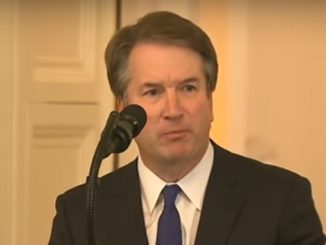
President Donald Trump’s pick to lead the FBI on Wednesday repeatedly sought to reassure lawmakers that he would lead the bureau with a strict commitment to maintaining independence from the White House. Chris Wray, 50, told lawmakers that he does not believe the federal investigation into Russian election meddling is a “witch hunt” contradicting the president’s own characterization of the probe, The Hill reports.
In calm and understated testimony before the Senate Judiciary Committee, Wray said that he would avoid one-on-one encounters with the president and that he would resign if asked to do anything unlawful.
“First, I would try to talk him out of it, and if that failed, then I would resign. Anybody who thinks I would be pulling punches as the FBI director sure doesn’t know me very well,” he said earlier.
Wray, a former senior Justice Department official under President George W. Bush, is a relatively uncontroversial choice to replace James Comey, whom Trump fired this spring. Yet the circumstances surrounding Comey’s dismissal made Wray’s testimony to the Senate Judiciary Committee a high-stakes affair, The Hill adds.
The president has said the federal investigation into his campaign and Russia was on his mind when he made the decision to fire Comey, and the former director has publicly testified since that Trump demanded his political loyalty and repeatedly badgered him on the investigation, now in the hands of special counsel Robert Mueller.
“All of this raises important questions for the next FBI head and particularly for his independence. The FBI director does not serve the president. He serves the Constitution and the American people.” said ranking member Dianne Feinstein.
Wray repeatedly echoed that principle, vowing that his loyalty would be to the Constitution and the American people.
“I think the relationship between any FBI director and any president needs to be a professional one, not a social one. And there certainly shouldn’t be any discussion between the FBI director and any president about how to conduct particular investigations or cases,” he added later.
He said that any effort to tamper with Mueller’s investigation would be “unacceptable and inappropriate” and vowed that he would notify the committee of any such effort if appropriate. “I do not consider Director Mueller to be on a witch hunt,” he said.
Wray assured lawmakers that he had not been asked to give any kind of oath of loyalty during his confirmation process “and I sure as heck wouldn’t offer one”.
Wray also criticized his predecessor’s decision to publicly announce that no charges would be brought in the Clinton email investigation.
“I can’t imagine a situation where I would be giving a press conference on an uncharged individual,” he said.
In perhaps the most heated moment of the hearing, Senator Lindsey Graham pressed Wray on emails recently published by Donald Trump Jr., showing that he accepted a meeting during the campaign with a Russian lawyer purportedly offering damaging information on Clinton.
Graham repeatedly pressed Wray on whether the meeting was appropriate and whether the FBI should have been promptly notified. Wray declined to comment on the specifics, arguing that he had only just learned the contents of the emails when Graham read them aloud, but eventually responded in the hypothetical.
“You’re going to be the director of the FBI, pal. So here’s what I want you to tell every politician: If you get a call from somebody suggesting that a foreign government wants to help you by disparaging your opponent, tell us all to call the FBI,” Graham cut in.
“To the members of this committee, any threat or effort to interfere with our elections from any nation-state or any nonstate actor is the kind of the thing the FBI would want to know,” Wray replied.
If confirmed, Wray will be tasked with rebuilding the morale of a workforce that by all accounts was deeply disaffected by Comey’s dismissal, The Hill comments.




Be the first to comment